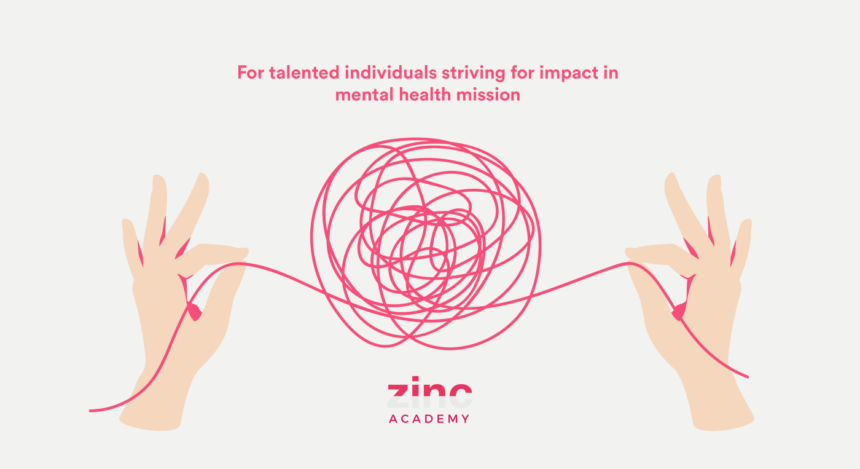A Wider Paradigm for Meeting the Global Challenges of Mental Ill-health

Five weeks from now Zinc will launch a new mental health academy bringing together passionate individuals from diverse backgrounds who are frustrated by the unacceptable levels of mental ill-health they see around them locally, nationally and globally. As society becomes more advanced and complex, and as quality of life, by some measures, increases for some, we are becoming more aware that these developments appear to be paralleled by an increase in stress, distress, inequality and dislocation — distressed children and adolescents, mid-life despair, isolated and neglected older people, overwhelmed staff, populations ground down by poverty, increasing deaths of despair, and many more suffering the effects of trauma, discrimination, erosion of human rights and exclusion.
The aim of The Academy, is to meet these challenges head on and support and empower those who are dedicated to effecting change to having a positive impact on people and populations to reduce mental ill-health and increase health.
As a clinician I am acutely aware of a widespread frustration at the inadequate explanatory power of mainstream models of mental ill-health and the similar inadequacy of medical services to address the deep problems that exist — both because of the nature and scale of the problems and the nature of the solutions on offer. I share these frustrations. We must open up the debate and the solutions beyond medicine to involve everyone who can understand and support those who are distressed, and build new solutions in our families, neighbourhoods, communities, workplaces, schools, colleges and universities, in our legal and financial services, social services, criminal justice, government policy and beyond.
1. Things are changing but progress is inhibited by the language of disorder.
For a few years now there has been an increasing awareness that mental ill-health is ubiquitous and has many downstream health and social consequences — and that we should be more prepared to deal with it. This is great progress compared to 18 years ago when I qualified as a doctor — but there is still some way to go. It is too soon to know whether the tide has turned but my suspicion is that it has not. I believe this is because progress is systematically inhibited as we are still rooted in the language of disorder and are thus failing to appreciate the complexity of underlying determinants of ill-health and health at both an individual and population level.
What does it mean, for instance, to say that a small minority of those with mental health problems get treatment and that almost all of those with cancer do? This is surely in part a consequence of inadequate provision of services and lack of recognition, but the reasons are even more fundamental than that — that the great extent of human suffering that comes the way of health services should not be viewed as a medical problem alone: but as an epiphenomenon of the complexity of human experience of an increasingly complex society? The framing of mental ill-health has too long been exclusively a biomedical one which has limited discussion to the language of disorder. This in turn sends the implicit message — at the level of the individual — that suffering is disordered and that the responsibility of recovery is that of medical systems. At the population level it has perpetuated stigma by dividing us into those who are sick or ‘disordered’ and those who are not. I believe that this has been a grave mistake and has impeded any real progress.
2. How did this happen?
Around 100 years ago, Psychiatry made a fundamental attribution error after the discoveries that syphilis and pellagra — or vitamin B3 deficiency — were major causes of mental disorder and subsequently discovered that they could be cured by penicillin and vitamin B3, respectively. This led to a century of monocausal (or single cause) theories that have yielded little save for some convincing pharmaceutical advertising copy. When I started medical school in 1996 the serotonin theory of depression was just cresting. The idea had a certain attraction and some utility. Among other things it absolved people of blame for their condition — a positive move — but this and other movements to medicalise stress and distress had a secondary effect of absolving governments, corporations, educational institutions, and employers of the responsibility for safeguarding the health of those under their influence. If these were diseases — then the culprits must be genes and haywire brain chemicals.
Tom Insel oversaw the resulting research movement at The National Institutes of Mental Health in the US and subsequently reflected: “I spent 13 years at NIMH really pushing on the neuroscience and genetics of mental disorders, and when I look back on that I realise that while I think I succeeded at getting lots of really cool papers published by cool scientists at fairly large costs — I think $20 billion — I don’t think we moved the needle in reducing suicide, reducing hospitalisations, improving recovery for the tens of millions of people who have mental illness”. Many warnings from psychologists, public health professionals, sociologists, and other groups had not been heeded and the realisation was, alas, too late.
In medical school I learnt that diagnosis is everything. And my students learn the same implicit message today. Doctors in fact prefer arbitrary labels even if those labels provide no explanatory power. I don’t mean to give the impression that I think diagnosis should be discarded altogether — there are situations where it is appropriate and medical expertise and, sometimes medication, is required — but I believe that as soon as we label something as complex as a person’s suffering we lose an enormous amount of information. As Richard Feynman noted:
There’s a difference between knowing something and knowing the name for something.
Psychiatry has forgotten something that the rest of medicine learnt many years ago — most chronic health problems don’t have a single cause, and complex problems can’t be remedied by simple solutions.
3. How should we view Mental Ill-health?
I spend most of my time working as a clinician. I work with patients with complex physical and psychological problems. Every time I see a patient I am struck by the same thing. Whether they have a diagnosis of some form of depression, anxiety, eating disorder, post-traumatic stress disorder, personality disorder, substance dependence, unexplained physical symptoms, or almost anything else. I am struck not by how different these people with different diagnoses are (297 diagnoses in the DSM-V and counting) — but by how similar they are. Co-morbidity — the term for when a person has more than one disorder — is the rule not the exception in psychiatry. Again and again we find that the people who develop one set of disorders are the same people who develop another set of disorders.
Consider a patient that I saw last year with an experience very typical of the patients that I see every day. He had been diagnosed with anorexia nervosa. It was true that he fulfilled the diagnostic criteria for this disorder. He also described persistent and intrusive distressing thoughts which were intolerable and for which the only successful strategy he was able to implement was restricting his calorie intake. This gave immediate relief. This is an obsessive-compulsive disorder. He also described an overwhelming urge to use this strategy and, as he became more distressed he needed higher doses, as it were, of the behaviour. It became more extreme and was used to the exclusion of any other strategy. This is addiction. The experience of distress rose to such a pitch that he could not bear to be alone with his thoughts and experienced physical symptoms of anxiety when in any situation in which he was not distracted or restricting. This is a phobia. Even when approaching such a situation his heart would start to pound and he would start to hyperventilate. This is panic via the mechanism of classical conditioning. His partner had become, to a degree, complicit in that he found himself, for fear of losing him to suicide, backing down in his attempts to seek help for him when his partner’s distress rose to fever pitch. This is operant conditioning — the effective reward, despite best intentions, of his avoidance and thus his distress. And there are a dozen more ways of understanding his distress. Having been professionally successful he was now unemployed. He had no activity in his life to provide positive reinforcement. He did no exercise because he was too weak. He slept poorly due to pain. He was bereaved. He was a survivor of terrible abuse. He had been excluded at school because he was gay. He had no money and was at risk of losing his home.
The initial label provides virtually no explanatory information. It provides only the false sense that one has captured something discrete and understandable. But real understanding requires an understanding of these many processes and experiences. From the moment to moment of a person’s inner experience, to the narrative that shapes them and comes from decades of learning the story of who they are — for better or worse. Syndromic diagnoses are a collection of symptoms. The best way to think of diagnoses — and thus symptoms and syndromes — is as final common pathways of a variety of processes — physiological, psychological, social, pathological — rather than being discrete entities themselves. In fact, in the case outlined above, the young man made excellent progress following a long period of intensive input from psychologists, other professionals, and his loved ones — but only once the underlying processes and experiences had been identified could they be addressed. These relationships, and the development of his own sense of autonomy and a stake in his own future, were the crucial mechanisms of change.
4. Whose responsibility is this and what is the way forward? Understanding systems, complexity, and underlying processes.
Society needs a new approach to the rising tide of mental ill-health. We should emphasise these processes rather than emphasising disorders. Processes and mechanisms both of the development of illness and of recovery and change. Around the world now there is a small but growing community of clinicians, researchers and others who are doing just this.
The psychologists, psychotherapists, psychiatrists, nurses, occupational therapists, social workers, and other mental health professionals who treat patients have an extraordinarily difficult job — made even more difficult I believe by the narrow biomedical framing of mental disorder. Understanding and alleviating mental ill-health requires great skill and empathy. Not only at any given moment is it necessary to hold at least 2 dozen or so interacting frameworks for understanding mental ill-health — but it is also necessary to be able to zoom out and zoom in to capture the necessarily scale-dependant nature of these problems such that one must be able to speak to an individual and understand their problems at a given moment in terms of predominantly beliefs and personal schemas, or cognitive styles — while also being able to zoom out and see a population’s problems as predominantly a consequence of inequality, economic adversity, wider social and cultural determinants and discrimination. Psychotherapy research has historically been separated by school of psychotherapy rather than focusing on common mechanisms — each school viewing distress only through its own lens. Examining mental health by looking through only one of these lenses will frustrate any attempt to effect change.
Over the past few years, working as a Consultant in Psychological Medicine in the NHS — in my clinical work, lecturing and supervising medical students — and in my work with entrepreneurs and scores of people from backgrounds as diverse as engineering, design, medicine, psychology, leadership and public health I have learnt something very important. Every new person — from whatever professional background — brings something new to any discussion about mental health. We should listen to more people from different backgrounds — whether they are people with lived experience — whose views are shockingly underrepresented in the academic literature — minority groups, coaches, behaviour change experts, organisational leaders, parents, and others who are passionate about the health and flourishing of their fellow citizens. And especially if we listen to people who have survived and thrived after terrible suffering and trauma — then we will gather a lot more evidence of what works and help more people survive and thrive. After all, there is no conceivable realm of human experience or endeavour that is not by definition both affected by, and a component of, mental health.
I believe that if we embed in people, in our communities and in our institutions an understanding of temperament — or personality, of individuals’ strengths — as well as their vulnerabilities, of the effects of trauma, abuse, and neglect, of habits and behaviour change, of thinking styles and rumination, the effect of good nutrition, sleep, and physical activity, the effect of chronic stress and inflammation, the importance of meaning, purpose, connection and belonging; the power of personal narrative to thwart and to elevate, the difference between the experience of individuals and the experience of populations; the systems and other contexts in which people reside — such as families, communities, the workplace, and society at large; the experience of abuses of power, the experience of inequality and poverty, and yes — disease processes, we will go a long way towards helping people to recover and thrive.
We must acknowledge that modern society is unhealthy in many ways. And that it is therefore society’s — that is, our — responsibility to countervail this unhealthy effect, through widespread education and support. This should be the responsibility of every government, organisation, healthcare professional, carer, parent, friend, leader and community. Passionate and motivated individuals need to be trained, supported, and empowered to understand mental health and ill-health and know how and when to take action.
The moon-shot goal of The Zinc Mental Health Academy is to use the extensive body of knowledge of things that do work to prevent and alleviate mental ill-health, to empower people to implement and scale these solutions in their institutions, their workplaces, communities and wider society, and to identify and scale novel solutions.
We need people from every walk of life to help us achieve this. Get in touch below if you want to join us on this mission.
___________________________
The Zinc Academy will accelerate the impact of those individuals who want to contribute other system-level solutions. It’s a place for changemakers who are passionate about making progress on complex problems. The first Academy programme starts in April 2020.
Please contact academy@zinc.vc if you would like to find out more.
Join the Zinc community
Stay up to date with all Zinc updates and future posts as part of our fast growing community.
Featured Resources
Zinc Impact Report 2024
Zinc’s mission is to make the UK the best place to successfully start a venture which can have a massive impact on the health of people and the planet.
Increasingly, we are building deeper science ventures that serve global, industrial customers in environment and health, giving access to impact at a global scale.
Our 2024 Impact Report explores the challenges that need to be tackled to empower and enable talented founders from around the world to solve critical health and environmental challenges at scale, from here in the UK.
This report showcases success stories from the Zinc portfolio, and highlights how Zinc – and our growing community of hundreds of Founders, Fellows, Coaches, Partners and Funders – are working together to build a world-leading “Science-for-Impact” ecosystem for inception stage ventures in health and environment.
Impact Report 2023
We started Zinc with the hypothesis that missions are an effective way to attract highly ambitious, talented and experienced groups of innovators, who might not recognise themselves as “classic entrepreneurs” but are ready and able to start a new commercial and successful venture to tackle some of our most pressing societal issues.
The world has overcome the sorts of challenges we face today when it has adopted a mission-based approach to the biggest problems and brought together world-class talent to invent and innovate, e.g: NASA and landing a man on the moon, the LSE blueprinting the British welfare state, or the Gates Foundation aiming to eradicate diseases.
On this basis and assumption, we designed Zinc as a new mission-based Venture Builder — a place where global talent, ‘impact makers’, can join to experiment and develop new solutions to our most pressing societal issues.


